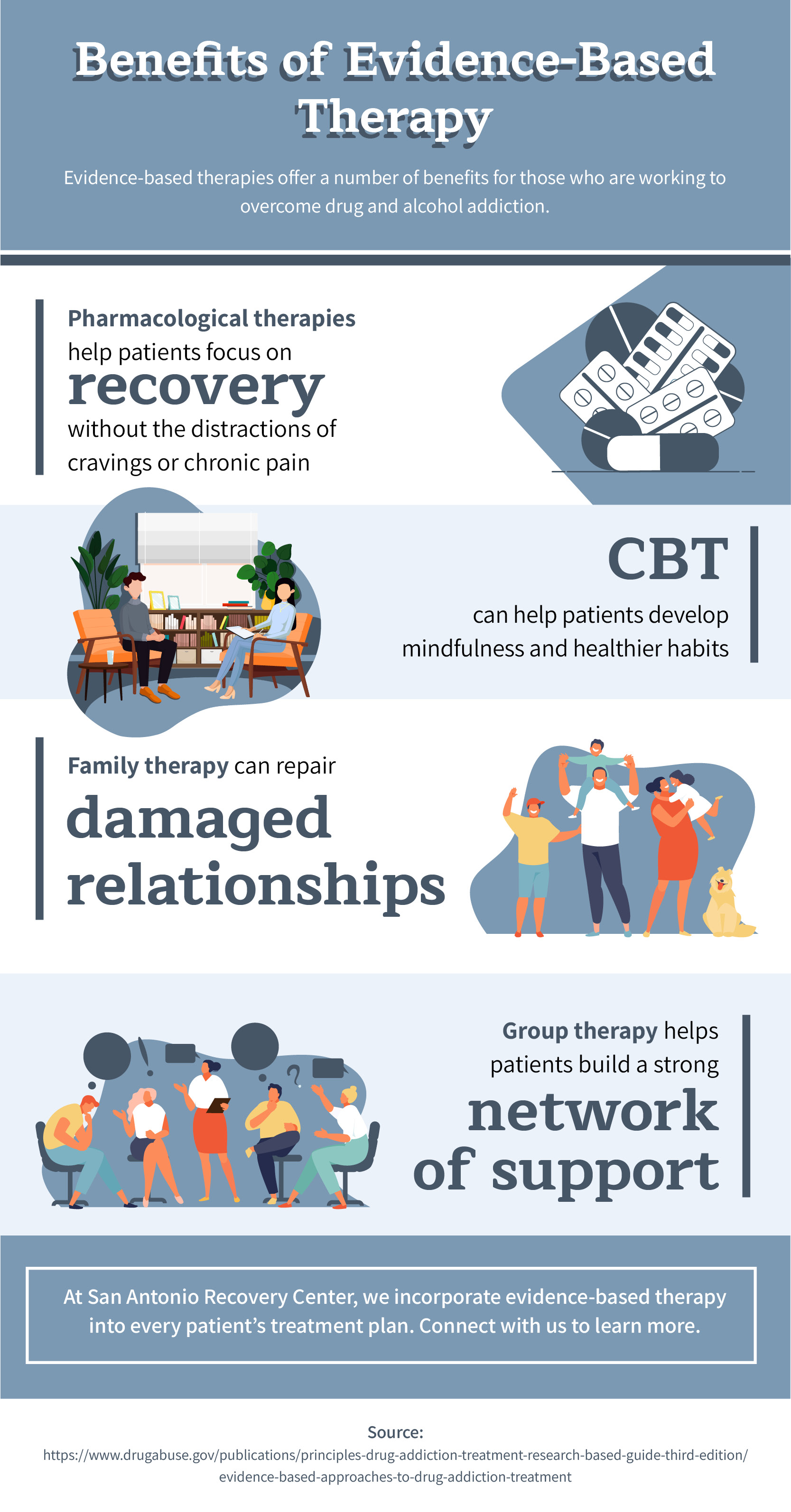There's no one-size-fits-all approach to addiction recovery.
There’s also no such thing as a quick fix in the fight against addiction. Addiction therapy can take time and is most successful when it’s comprehensive and multifaceted. At San Antonio Recovery Center, we incorporate a variety of addiction therapies into our patients’ treatment plans. Our approach to treatment involves a holistic approach, where we help patients heal in body, mind, and spirit. We also use the principles of the 12 steps as a foundation for treatment. But our evidence-based therapies are where much of the work of healing is done. During sessions with an experienced therapist, our patients work through the underlying causes of addiction and develop the healthy coping skills they need to avoid relapse.
If you’re ready to take your life back from addiction, reach out to our team today. Contact us at 866-957-7885 or connect with us online to begin your journey to recovery.
Evidence-based therapy involves scientifically proven treatment methods. In order for an approach to treatment to be termed “evidence-based,” there needs to be research that shows that it is effective.
Some of the qualities of evidence-based therapy include:
Evidence-based therapy is just one of the approaches we use at San Antonio Recovery Center. Reach out to a member of our team today to learn more.

In many ways, behavioral therapy is the bedrock of addiction therapy.
This approach to therapy helps those struggling with addiction and co-occurring mental health disorders by addressing harmful behaviors. Under the guidance of a therapist, patients identify destructive behaviors, learn about the underlying causes of these actions, and develop healthy coping skills to avoid them in the future.
Cognitive-behavioral therapy, or CBT, helps patients take a direct, hands-on approach to solving their problems. It seeks to help patients better understand the difference between thoughts and feelings, and it may encourage positive habits and behaviors. CBT can eliminate or reduce the negative thoughts that slow down and block recovery.
Eye movement desensitization and reprocessing, or EMDR, is a therapeutic modality that uses a series of rapid eye movements to help patients process trauma. Therapists go through extensive training to offer this type of therapy, and it can be highly effective for those struggling with PTSD and other mental health issues.
It’s vital for rehab facilities to offer dual diagnosis therapy. This therapy addresses the issue of mental health and its impact on the development of addiction. Through dual diagnosis therapy, those who struggle with mental health issues such as bipolar disorder, depression, anxiety, or schizophrenia receive the treatment they need. This treatment coincides with addiction treatment, which helps patients understand their triggers for relapse and create a life that is conducive to recovery.
Family therapy is an excellent way to utilize an existing support system. In rehab, family therapy may be sporadic. However, it should continue after rehab has ended with the help of a counselor or therapist. This approach helps provide accountability to patients. Meanwhile, it also helps to educate family members about the illness of addiction and how to help, rather than enable, those struggling with it.

Did you know that certain medications have actually been proven to help those on the road to recovery from drug and alcohol addiction? While no medications can cure addiction, several have been FDA-approved to curb cravings and relieve withdrawal symptoms, especially those related to opioid or alcohol addiction. When appropriate, we incorporate pharmacological interventions into our patients’ treatment plans alongside other evidence-based therapies.
In some cases, pharmacological therapy works well for treating addiction. While it isn’t necessary for all patients across the board, some need prescriptions and medical attention to handle a wide range of issues.
For example, some patients with severe opioid addictions may require synthetic versions to help wean them off of opiates altogether. Others require medications for infections obtained while using drugs. Sometimes, patients just need comprehensive medical care, which might not have been available during the height of their addiction. Some patients rely on pharmacological treatment both in and out of rehab to help them maintain their sobriety.
When partnered with therapy, medication can help patients focus on overcoming the underlying issues that may have led to addiction. This can lead to positive long-term outcomes. Talk to a member of our treatment team today if you’re interested in learning more about medication-assisted treatment.
Since therapy is such an integral part of treatment at San Antonio Recovery Center, we incorporate therapy sessions into each day in our center. Our daily rehab schedule allows each of our patients to try new experiences and activities as well as participate in therapy. Depending on whether you are part of a residential treatment program or an outpatient program, the number of therapy sessions you participate in might vary. However, keeping to a schedule during treatment can be helpful. Knowing what to expect and having consistency can help you develop stronger coping skills for the future.
We evaluate each of our patients on an ongoing basis to ensure they are getting the most out of treatment and that they are reaching their goals. We develop personalized treatment plans for every individual in our care and can adjust these as needed.
In the evenings, our patients participate in 12-step meetings and have time to themselves where they can journal, meditate, or just spend time reflecting on what they’ve learned.
In rehab, there are a number of alternative and holistic therapies that are helpful for patients. These can include, but are certainly not limited to, the following:
While these therapies are not necessarily evidence-based or scientifically proven to be effective, we’ve seen how incorporating these approaches into treatment helps our clients heal. Yoga and exercise can be healthy outlets for stress. Nutritional therapy helps patients learn how to plan healthy meals after treatment. Recreational and experiential therapies offer opportunities for patients to try new activities in sobriety that they might enjoy in the future. And spirituality is such an important part of life for so many individuals that we’ve found ways to incorporate it into treatment.
It’s important to understand that addiction recovery doesn’t end when patients leave rehab. To maintain sobriety and prevent relapse from occurring, those in recovery should always take advantage of aftercare programs.
As the name suggests, an aftercare program is a treatment approach that takes place after rehab ends. It includes ongoing therapy, continuing 12-step or Alcoholics Anonymous meetings, rehab alumni events or meetings, family therapy, or even transitional living. These methods of aftercare can all aid in accountability and ensuring that patients can successfully continue on the road to recovery.
Patients in all of our addiction treatment programs have access to the evidence-based therapies we offer.
Our treatment team can help determine which of our treatment programs is right for you. Many of our patients take advantage of our full continuum of care by starting in detox and going through a 90-day program. Our aftercare services ensure you have the support you need for lasting recovery.
We help our patients make lasting changes in their lives. If you or a loved one is struggling with addiction to drugs or alcohol, making a call to our treatment center might be the first step on the road to lifelong recovery. Through our evidence-based therapies, you’ll develop the healthy coping skills you need to avoid relapse and take back your life from addiction.
Connect with a member of our team today by contacting us at 866-957-7885 or reach out to us online to learn more. At San Antonio Recovery Center, you’ll find the supportive environment you need to heal.
contact us now!
